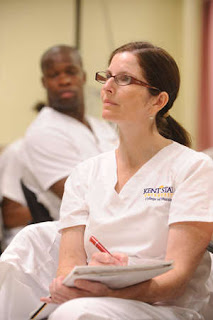Registered nurses (RNs) are the nurses who have received a diploma or have had degree-level training in nursing (Associate Degree in Nursing). These nurses are therefore licensed by the board of nursing in a state to practice in the field of nursing. Registered nurses do not necessarily have a bachelor's degree in nursing, but you might wonder what difference it makes to have a bachelor's degree. Well, for one, a registered nurse with a Bachelor of Science qualification is given way more responsibilities, which means more nursing job opportunities as well as higher salary. This is why more and more RNs these days are aiming to upgrade their qualifications to BSN. This can be done by taking an RN to BSN program.
An RN to BSN program is a transition or bridge program designed to help registered nurses obtain Bachelor of Science degrees. This program includes a uniquely designed curriculum for nursing students who graduated from hospital schools, community colleges and are licensed nurses. An RN to BSN program is offered by various universities in a very flexible and partially online format. This program is not primarily online, though. The beauty of this program is that it can be completed in just 2 semesters. The schedule of classes for this program is also made flexible to let the nursing students maintain employment while they are still completing the program.
Registered nurses who are looking to earn a BSN must have an unrestricted and current license to practice as a registered nurse in the state in which they are applying. Those who have a bachelor's degree in a non-nursing field may also take an RN to BSN program but there will be additional requirements, making the program take longer to complete. If your RN license has expired, you will also need to take extra courses and meet more requirements to qualify for the program.
Associate degree nurses who are accepted to an RN to BSN program are required to take these nursing courses that cover concepts and subjects not involved in lower level nursing courses:
* RNs aiming for a BSN degree must take professional nursing courses, which account for 6 credit hours. These are the courses that cover concepts and topics that are related with how a staff nurse can perform the roles of a professional nurse. The course will teach students the responsibilities of a professional nurse, which actually has nothing to do with managing the nursing staff.
* Students of an RN to BSN program must have 7 credit hours taking courses associated with topics on holistic healthcare across a patient's lifespan. These courses deal with how a patient should be treated while taking into consideration his physical health, psychosocial wellbeing, nutrition and even his spiritual wellbeing.
* RN to BSN bridge program students should take a 3 credit hour course on health promotion. This course explains to students the role of professional nurses in illness prevention and health promotion. The course covers strategies for the promotion of healthy lifestyles in various communities.
Search for RN to BSN programs and other accelerated nursing programs right now in our full directory of accelerated nursing programs in the United States.
Accelerated Nursing Guide provides you with extensive nursing career and employment data along with looking at all the accelerated nursing education and training options available. The information includes occupation descriptions, salaries, the types of work opportunities available, specifics of nurses working conditions, job satisfaction, benefits of the profession plus points detailing the quickest way to become a registered nurse. The information also includes a complete directory and contact details of schools offering accelerated nursing programs in America, along with their course structure and curriculum details.
If you are exploring your career and training options and are contemplating a career in nursing, Accelerated Nursing Guide is well worth taking a look at.

No comments:
Post a Comment